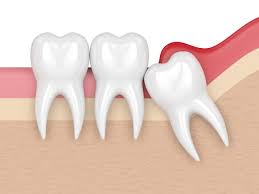Wisdom teeth are teeth that are not yet fully developed and can cause pain when they come in. There are a few different ways to deal with wisdom tooth pain, but the most common is to take ibuprofen or paracetamol. Sometimes a dentist can remove the wisdom tooth if it is causing pain.
What are Wisdom Teeth?
Wisdom teeth are the last set of baby teeth to come in. They typically emerge between the ages of 18 and 24 months, but can arrive as early as 6 to 12 months. When wisdom teeth arise, they may cause discomfort because they get in the way of other teeth or bite into food.
A wisdom tooth is normally removed when it causes significant pain or when it becomes a health hazard. Removal may require surgery, but often a local anesthetic and antibiotics are sufficient to ease the patient’s pain.
Following removal, a person’s smile will look better and he or she will likely be less prone to dental cavities. It is important to remember that the health of a wisdom tooth depends on the wisdom of the patient.
Wisdom teeth may be removed for cosmetic reasons, or for health-related reasons. The decision to remove a wisdom tooth should be made by your dentist with you and your physician. If you are contemplating wisdom tooth removal, contact your dentist
Symptoms of Wisdom Teeth Pain
If you have any of the following symptoms, you may have wisdom teeth pain:
- Pain when biting or chewing
- Uncomfortable pressure when eating or drinking
- Trouble sleeping because of the pain
- Dental headaches
- Numbness or tingling in the jaw or face
- A pulling, popping or clicking sensation when moving your jaw and teeth
Treatment Options for Wisdom Tooth Pain
Treatment options for wisdom tooth pain vary depending on the severity of the pain, the age of the patient, and other medical conditions. Some common treatment options include over-the-counter medications, prescription painkillers, and visits to a dentist.
Over-the-counter medications that are often used to treat wisdom tooth pain include ibuprofen and aspirin. Prescription painkillers such as acetaminophen (Tylenol) or codeine can provide shorter-term relief from wisdom tooth pain.
To reduce inflammation and relieve symptoms, a dentist may recommend oral antibiotics or a root canal. If the pain is severe or doesn’t respond to over-the-counter treatments, a dentist may recommend a tooth extraction.
What Causes Wisdom Teeth Pain?
Wisdom teeth are often present at birth, but they become fully developed around 18 months of age. Wisdom teeth can erupt through the gum tissue and surface in a wide range of different ways, including: Partially erupting through the gums.
The root of the tooth, surrounding bone, and gum can all cause pain. If a wisdom tooth is impacted, it may be possible to remove the tooth without causing pain. If there are multiple impacted teeth, it may be necessary to remove all of them at once. The nerves and blood vessels in your mouth can also be damaged by impacted teeth.
Here are some few causes of wisdom teeth pain:
- Partially erupting at an angle to the gum line.
- Erupting from underneath the gum tissue. Erupting through the gum tissue. Erupting from under the gum tissue, but still within the jawbone.
- Wisdom teeth can be impacted or impacted. Impacted wisdom teeth are embedded too deeply into the jawbone and may cause pressure on nerves and blood vessels in your mouth.
Tips for Coping with Wisdom Teeth Pain
If you’re experiencing tooth pain, there are a few things you can do to ease the discomfort. Here are some tips to help deal with wisdom teeth pain:
- Drink plenty of water to keep your mouth wet and reduce the amount of dryness and heat produced by the pain.
- Apply ice packs or cold therapy to the area around your teeth for relief.
- Take ibuprofen or acetaminophen (taken before bedtime if desired) for pain relief.
- Eat soft foods that don’t crunch or cause pain when chewing. This includes ice cream and popsicles, gummy bears, chewy candies and frozen yogurt.
- Avoid drinking coffee, tea and alcohol since they can worsen the pain.
- Ask your dentist or dental hygienist for a recommendation on pain medications to help with the pain.
Conclusion
If you have wisdom teeth, it’s important to know about the pain symptoms that can occur. If you experience any of these symptoms, see your dentist as soon as possible. Wisdom teeth are usually removed through a minimally invasive surgery known as a Lateral Maxillectomy.
However, if the pain is severe and ongoing, your dentist may recommend an open surgery or a more extensive procedure such as a Full Maxillectomy. Wisdom teeth generally take around 12-18 months to fully erupt after they are removed and this can cause significant discomfort and even pain in some cases.
